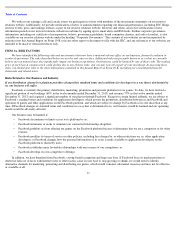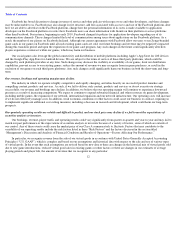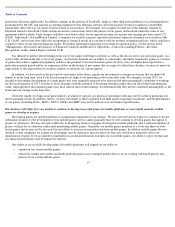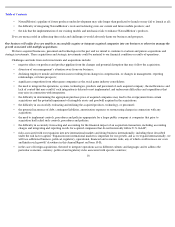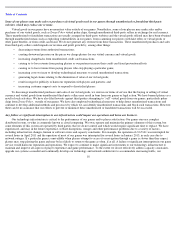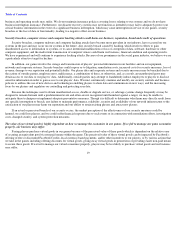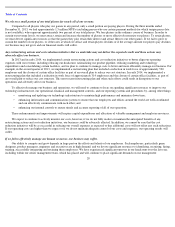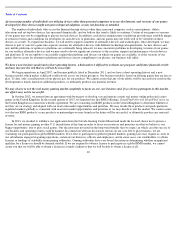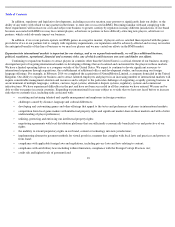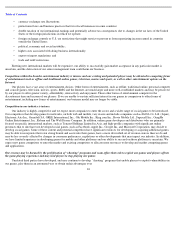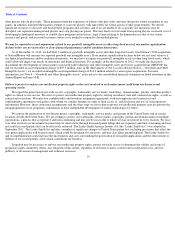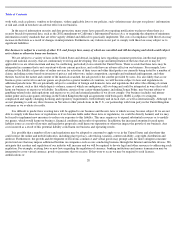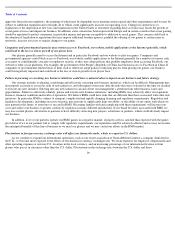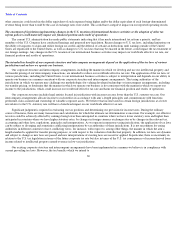Zynga 2013 Annual Report Download - page 25
Download and view the complete annual report
Please find page 25 of the 2013 Zynga annual report below. You can navigate through the pages in the report by either clicking on the pages listed below, or by using the keyword search tool below to find specific information within the annual report.
Table of Contents
and our operational, financial and technological infrastructure. As of December 31, 2013, approximately 22% of our employees had been with us
for less than one year and approximately 52% for less than two years. In addition, in 2013, three of our executive officers resigned.
We believe that two critical components of our success and our ability to retain our best people are our culture and our competitive
compensation practices. As we continue to develop the infrastructure of a public company, we may find it difficult to maintain our
entrepreneurial, execution-focused culture. In addition, our recent operating results, the decline in our revenue and the current trading price of
our Class A common stock may cause our employee base to be more vulnerable to be targeted for recruitment by competitors. Some of our
employees may have been motivated to work for us by an expectation that our Class A common stock would be trading at a higher value and
may be less motivated by the equity compensation they receive as a result. Competitors may leverage any resulting disappointment as a tool to
recruit talented employees.
We have historically hired a number of key personnel through acquisitions, and as competition with other game companies for attractive
target companies with a skilled employee base increases, we may incur significant expenses in continuing this practice. In addition, our recent
operating results, the decline in our revenue and the current trading price of our Class A common stock may negatively impact our perceived
reputation and make it more difficult and more expensive to recruit new employees. The loss of talented employees or the inability to hire skilled
employees as replacements could result in significant disruptions to our business, and the integration of replacement personnel could be time-
consuming and expensive and cause additional disruptions to our business. If we do not succeed in recruiting, retaining, and motivating our key
employees to achieve a high level of success or if we do not attract new key personnel, we may be unable to (i) continue to launch new games
and enhance existing games, including in each case on mobile, (ii) expand our network, or (iii) execute our business strategy, and as a result, our
business may suffer.
Our core values of focusing on our players first and acting for the long term may conflict with the short-term interests of our business.
One of our core values is to focus on surprising and delighting our players, which we believe is essential to our success and serves the best,
long-term interests of Zynga and our stockholders. Therefore, we have made in the past and we may make in the future, significant investments
or changes in strategy that we think will benefit us in the long term, even if our decision negatively impacts our operating results in the short
term. For example, in early 2013, we decided to discontinue development of certain games that were originally expected to be released and then
meaningfully contribute to bookings for the second quarter of 2013, in order to focus on games with the potential of becoming franchise games
that drive long-term enterprise value. Although these discontinued games may have offered short-
term bookings, we determined that they did not
contribute meaningfully to the brand and our strategy in the long-term. This decision to discontinue certain games could negatively impact our
operating results in the short term. Our decisions may not result in the long-
term benefits that we expect, in which case the success of our games,
business and operating results could be harmed.
If we lose the services of our Chief Executive Officer, founder or other members of our senior management team, we may not be able to
execute our business strategy.
Our success depends in a large part upon the continued service of our senior management team. In particular, our Chief Executive Officer,
Don Mattrick, and our founder, Mark Pincus, are critical to our vision, strategic direction, culture, products and technology. We do not maintain
key-
man insurance for Messrs, Mattrick or Pincus or any other member of our senior management team. The loss of our Chief Executive Officer,
founder or other members of senior management could harm our business.
21


